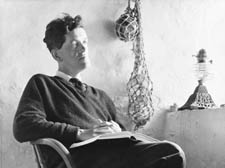
George Mackay Brown |
The universal voice of the Orkney Islands
Piers Plowright discovers a biography of Mackay Brown that is alive to the emotional power of his work
GEORGE MACKAY BROWN – THE LIFE by Maggie Fergusson,
John Murray, £25 order this book
THERE'S a short story by George Mackay Brown that has haunted me since I first read it. Celia is an alcoholic who, in exchange for booze, prostitutes herself among the men of the island fishing community she lives in.
Her view of life is bleak. “The world’s a torture chamber, just a sewer of pain” she says and describes a gull swooping on a rat, swallowing it whole, and taking off again, only to be broken open by the rat in its throat, so that the two fall into the sea. “The dead gull and the living rat made separate splashes in the water.”
It’s about as grim and hopeless an image as you can get, but by the end of the story, Celia has experienced some kind of mysterious grace and rediscovered her childhood faith. As Maggie Fergusson puts it in this engrossing biography: “We are left believing that all will be well for her.”
For me, this story has the essence of Mackay Brown’s writing, tough, unsentimental, poetic, and drenched with the light and dark of the Orkneys in which he spent most of his 75 years.
It also reveals a passionately felt relationship, since Celia is partly based on Stella Cartwright, a girl Mackay Brown met during his time in Edinburgh as an undergraduate in the 1950s.
Whether they were physical lovers or not is still not clear, but she certainly changed his life and became his muse, the most important of three women with whom the poet fell in love and was inspired by.
Not that you’d know it from his autobiography, which mentions Stella briefly but has no mention of the other two.
It was Maggie Fergusson who, encouraged by Brown to write his biography, sat down in Edinburgh University Library, just after his death in 1996, and broke the seal on a package containing hundreds of letters from George to Stella. A whole new man was revealed.
George Mackay Brown was born on the October 17 1921 in Stromness to the high-spirited wife of the local postman. Except for his time in Edinburgh and nearby Newbattle Abbey College under the inspiring care of the poet and translator Edwin Muir, and with brief trips to London, Oxford, and Aberdeen, he never left the Orkneys.
They were his landscape and his subject and he is their poet laureate, writing a flood of poems, short stories, some novels, a play or two and the fascinating but unreliable autobiography, about them.
He wrote mainly in his Stromness council-house, a notice scribbled on cardboard pinned to the front door: WORKING ALL DAY. But what he wrote was somehow universal. In a strange way this universality grew out of the three things that cudgelled him all his days: illness – he suffered from and fought TB; depression, which he inherited from his father, and religious hunger which brought him into the Roman Catholic Church in 1961.
Mackay Brown looked on these things, even the TB, as allies that pushed him on creatively when the pub, company, and sheer tiredness, beckoned.
In Maggie Fergusson, Mackay Brown has found the perfect biographer. Extremely sympathetic to him, as she makes clear in her introduction, she can be objective and see his faults: his selfishness – acknowledged by the poet himself – in leaving Stella Cartwright unvisited at a time when she desperately needed him, his bouts of drunkenness and, until his mother died, his childish inability to look after himself.
But she is acutely alive to the complications and emotional power of the man and his work, and she writes herself with a clarity and precision that seems worthy of her subject. It’s a good time too for the book to appear.
When he died, Mackay Brown was much admired by the poet Seamus Heaney and the composer Peter Maxwell Davies among many others, his novel Beside the Ocean of Time had been shortlisted for the Booker Prize and the BBC had made programmes about him as well as dramatising his work.
Ten years on he needs reappraising. In my opinion, he’s in the top 10 of 20th-century British poets and short-story writers.
|


